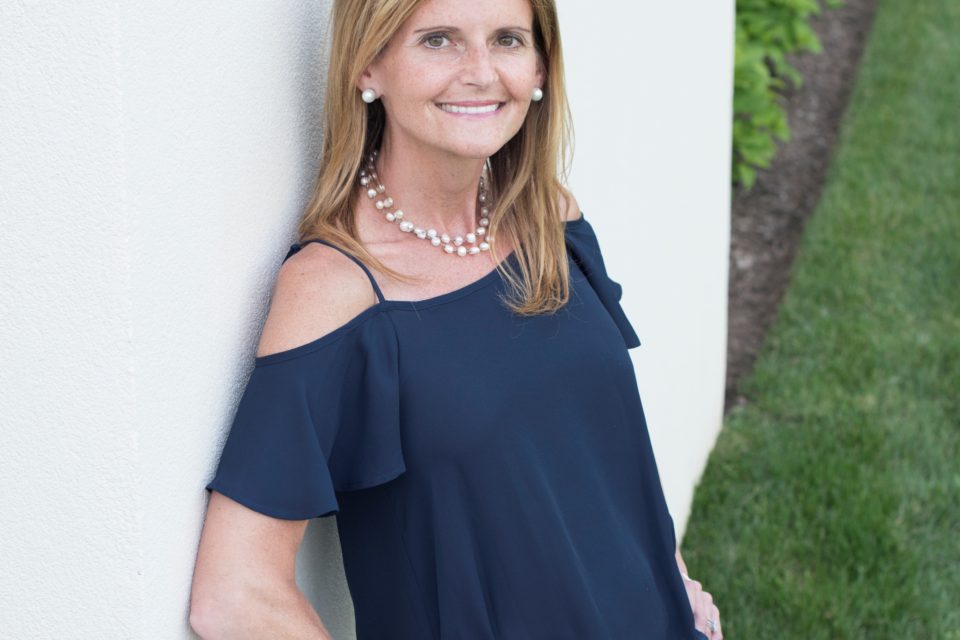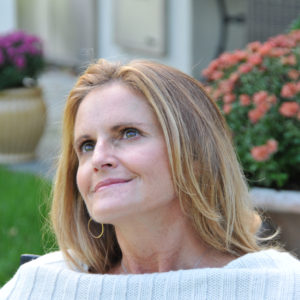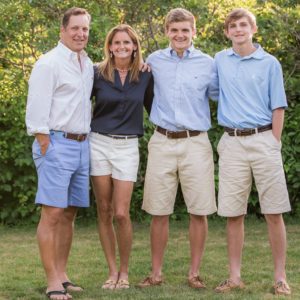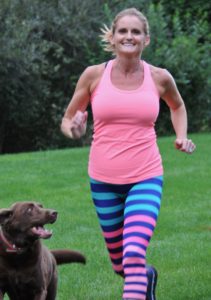Breast Cancer Genetic Screening: One Woman’s Story

Breast Cancer Genetic Screening: One Woman’s Story
Erin Reish has a strong family history of breast cancer. Both of her grandmother’s passed away from breast cancer at the age of fifty. Her aunt died of breast cancer at the age of 36. And her father’s aunts succumbed to it – one in her 20s and one in her 40s. It was a history that for decades presented red flags to her doctors.
Although most cancer is not hereditary, she worried in her 20s and 30s about her level of risk. Her doctors, including her ob/gyn, recommended she undergo genetic testing to test for her level of risk for the disease. “My mom is a nurse. She was always reminding me: ‘Do your breast exams.’ As soon as doctors let me, I started getting mammograms. I knew that at some point, I’d do the genetic testing.”
“I knew at some point, I’d do the genetic testing.”
Genetic testing can determine if there is a mutation in the BRCA genes. Nancy Cohen, MS, CGC, a certified genetic counselor at the Hospital explains: “We all have certain genes whose job is to make proteins (known as enzymes) that prevent the development of cancer.  The BRCA1 and BRCA2 genes make proteins that help repair damaged DNA. But when one of these genes has a mutation, the DNA repair doesn’t work right.” By disabling an important DNA repair process, these “high-risk” mutations raise a woman’s risk of breast cancer to 85 percent, and raise her risk of ovarian cancer to 44 percent, also increasing her risk of developing certain other cancers. Mutations in the two BRCA genes can be inherited from either parent.
The BRCA1 and BRCA2 genes make proteins that help repair damaged DNA. But when one of these genes has a mutation, the DNA repair doesn’t work right.” By disabling an important DNA repair process, these “high-risk” mutations raise a woman’s risk of breast cancer to 85 percent, and raise her risk of ovarian cancer to 44 percent, also increasing her risk of developing certain other cancers. Mutations in the two BRCA genes can be inherited from either parent.
So why wait? At first Erin struggled with the decision, knowing that testing might lead to a decision to have risk-reducing mastectomies and to remove her ovaries and fallopian tubes. Because she wanted a family as well as the option of breastfeeding, Erin put genetic testing on hold.
Then when she was 36 years old, her cousin on her father’s side, whose mother had passed away from breast cancer at 36, had the test for mutation in the BRCA genes and it was negative. “That seemed to take away some of the urgency for getting tested. I felt Denise was more likely to be positive than I was, since her mother had passed away.” This reassurance, however, was mistaken.
As she later learned, her “cousin had a 50-50 chance of being negative even if her mother had had a genetic mutation. But in my mind, I believed that if she was negative, I would definitely be negative. I was still considering having another child and didn’t want to feel the pressure to have myself tested. If Denise had tested positive for the BRCA mutation, I would have done it much sooner.”
Erin was reassured by her cousin’s negative test but that was a mistake
In reality, even though Erin’s cousin tested negative, Erin herself was potentially at risk. “Since her aunt who had the early breast cancer did not have testing, it was unknown whether she had a genetic mutation that could be inherited,” notes genetic counselor Nancy Cohen. “If the aunt had a mutation, then all family members were at risk to carry it, since it would have been inherited from a parent. As a result, Erin’s mother might be a carrier of the mutation.”
 Finally at age 45, and a mother of two teenaged boys, Erin went to Nancy Cohen at Northern Westchester Hospital to discuss genetic testing. “We discussed my family medical history, the different tests I could have, and what their results could mean for me. We discussed treatment options if results were positive for mutations, and even how life insurance could be affected by the results.”
Finally at age 45, and a mother of two teenaged boys, Erin went to Nancy Cohen at Northern Westchester Hospital to discuss genetic testing. “We discussed my family medical history, the different tests I could have, and what their results could mean for me. We discussed treatment options if results were positive for mutations, and even how life insurance could be affected by the results.”
“Nancy offered me the choice of a breast-focused test of 17 genes or a larger test of 32 genes. I chose the more comprehensive test.” Erin was prepared to take the test right away. It was a simple blood test, but as it turned out “it likely saved my life.”
Erin tested positive for a BRCA2 mutation. She also tested positive for a mutation in the MUTYH gene, an abnormality that increases the risk of colorectal cancer to about twice that of the general population.
Erin met again with Nancy. She learned about the specific risks associated with a BRCA2 mutation for a woman her age. While for breast cancer risk, Erin could either consider increased breast cancer screening or risk-reducing mastectomies, for ovarian cancer risk, she was already the age at which the ovaries and fallopian tubes should be removed. Regarding Erin’s MUTYH gene mutation, Nancy advised a colonoscopy as soon as possible, then at intervals of five years.
It was a simple blood test and “it likely saved my life”
Erin decided on several surgeries at Northern Westchester Hospital: a double mastectomy, breast reconstruction, and removal of her  ovaries and fallopian tubes. Her medical team included breast surgeons Drs. Karen Arthur and Ranjana Chaterji and plastic surgeon Dr. David Palaia. Obstetrician/gynecologists Dr. Adina Keller, who is also associate chief of Obstetrics at NWH, and Dr. Iris Wertheim, also a gynecological oncologist and co-director of NWH’s Institute of Robotic and Minimally Invasive Surgery, performed the removal of both ovaries and fallopian tubes.
ovaries and fallopian tubes. Her medical team included breast surgeons Drs. Karen Arthur and Ranjana Chaterji and plastic surgeon Dr. David Palaia. Obstetrician/gynecologists Dr. Adina Keller, who is also associate chief of Obstetrics at NWH, and Dr. Iris Wertheim, also a gynecological oncologist and co-director of NWH’s Institute of Robotic and Minimally Invasive Surgery, performed the removal of both ovaries and fallopian tubes.
“Following my double mastectomy, Dr. Arthur called to tell me that the pathology report on my breast tissue showed three separate early-stage cancerous tumors in my left breast. And Hallelujah, they were out of me! I did not need chemotherapy or radiation. I had reconstruction surgery nine weeks later and three months after that, I had surgery to remove my ovaries and fallopian tubes. All my NWH doctors were incredibly expert and caring.”
“Today I feel great – so great! I’m happy and I’m healthy. My message for women and men is, ‘Don’t wait. Meet with a genetic counselor. Knowledge gives you power over your health and your future.’”
Knowledge is Power: Northern Westchester Hospital’s Cancer Genetic Counseling Program
Because up to 10 percent of all cancer cases result from hereditary genetic risk factors that are passed from one generation to the next, it’s critically important to recognize families at high risk for an inherited predisposition to cancer.
To schedule an appointment with a genetic counselor, call (914) 223-8270.
For more information about NWH’s sophisticated cancer care, visit nwhcancercenter.org
More Articles from Northern Westchester Hospital

















